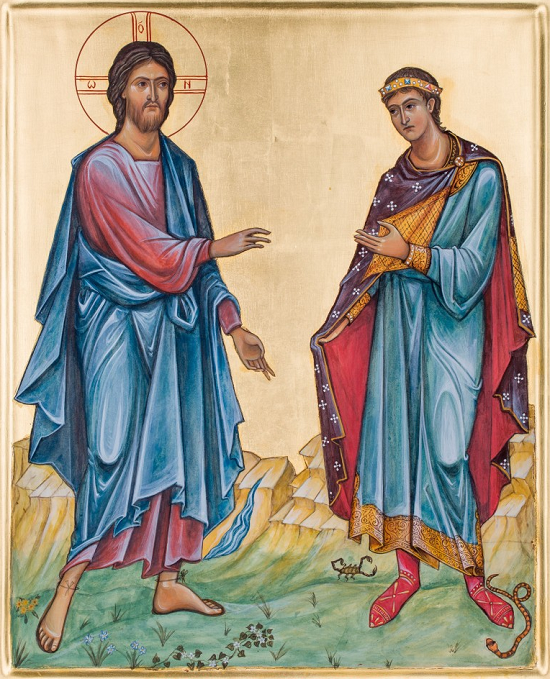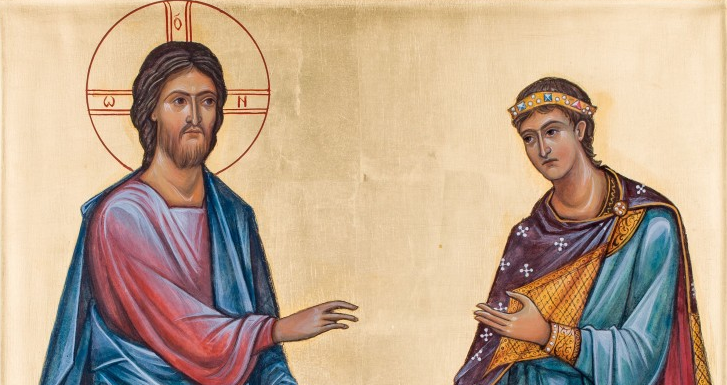School of Love
Twenty-Eighth Sunday Scripture Readings

In light of the gospel today, what do you think your chances are of making it to heaven? Not too great, if we’re going to take Jesus’s statements very literally. Consider that camel and the eye of that needle. True, nothing is impossible for God, but I think even God would have a tough time with that one unless the camel went through one molecule at a time. Even if, as some have suggested, the “Eye of the Needle” was a narrow mountain pass, from the reaction of the disciples, it still doesn’t seem very promising. This may be one of Jesus’s sayings that remains enigmatic, but let’s take a look at it, anyway.
The rich young man approaches Jesus in hopes of finding deeper meaning in his life. He’s looking for a spiritual experience and sees in Jesus someone who can point the way for him. He asks what he needs to do. When Jesus responds at first, he’s being ironic. The scribes and Pharisees could have given him the same answer that Jesus gives: obey the Law of Moses. I’m sure that the scribes and Pharisees had the Ten Commandments posted in their classrooms. The young man isn’t satisfied. If we read the text correctly, we realize that he’s saying to Jesus, “That hasn’t done it for me. There must be more.”
“Jesus, looking at him, loved him.” Why? Because the man’s spiritual hunger exceeded the results of simply doing the right thing all the time. When Jesus saw that mere obedience didn’t satisfy him, he saw in him a potential disciple—a real disciple. So, Jesus told him that he was lacking only one thing. Then, he told him what he needed to do, without ever telling him what it was that was lacking. Did you notice? The fact that the man “went away sad because he had many possessions” tells us that he didn’t figure out what was lacking, either. He didn’t go away because he couldn’t accept what Jesus was telling him, but because he lacked the willingness to obey Jesus’s command. The saddest part of all that was that he never got beyond the question of obedience. He didn’t make it down to the spiritual depth that Jesus was inviting him to experience. Did he catch on later? Let’s hope so.
Heaven, the Reign of God, eternal life, salvation: they’re all just different ways of saying the same thing. It’s how we express our yearning for something more, something beyond the limitations that hem us in. It’s a yearning for something lasting. The rich man’s many possessions didn’t lead him there. Even obedience to the will of God didn’t make it. What was Jesus calling him to that he couldn’t fathom—at least not right then? Detachment. Jesus was challenging him to let go and let God.
We want to fly. We want to soar beyond all our limitations, beyond our physical limitations, beyond our mental limitations, beyond our emotional limitations, beyond our spiritual limitations, and even beyond the limitation of death. The life, death, and resurrection of Jesus for our sakes have shown us that all of this is not only possible, but it’s the will of God for us. Yet, we’re held back. It’s what we’re holding onto and what we’re afraid of losing that keeps us earthbound. It wasn’t the young man’s possessions that kept him from following Jesus fully, it was his fear of losing them.
I have a theory about ghosts that seems to answer the question of why they hang around. I think it meshes very well with what’s been traditionally taught about life after death. Yes, I do “believe” in ghosts because I’ve experienced them personally. Here’s my theory. I believe that this life is a school for love, where every encounter and every experience present us with an opportunity to grow in love—that selfless love that Jesus showed. Life teaches us to love fearlessly as, throughout our lives, one by one, we experience the loss of all those things we relied on to keep us going. The goal is, of course, that, by the end, we’ve learned to cling to God alone. It’s not all about what we learn to detach from, but what we detach for: namely learning to trust God entirely who alone has the power to give us the wings of freedom.
What about those whose lives have run their course without their ever having completed the lesson of detachment into love? I think nothing much changes at death except that our physical, material body ceases to function and we’re free to pass out of time into timelessness. If we’re holding on in terror to those earthy things we relied on to save us, but couldn’t, we haven’t allowed ourselves to be set free of space and time. We remain stuck to the people, places, and things we clung to—the “many possessions” we don’t want to give away. If we haven’t learned to let go and let God before death, the process continues afterward. They’re like helium balloons tied down by their strings. I believe that these are the people we encounter as ghosts, and this is the continuation of the school of detachment we call purgatory.
I’ve experienced both kinds of people—those whose life slips peacefully away as they leave this plane of existence and go to God, and those who leave this life struggling, terrified as much by what they’re having to leave behind as by what awaits them. Yet, what awaits us all is the same—to become immersed in the love of our Creator and in the company of all those with whom he shares his infinite love. Yet, God never forces anyone to let go of our illusion of control over people, places, and things, and to trust only him. It takes whatever it takes to learn to let go.
May our lives not reflect the sadness of the young man who went away because he was afraid of losing his great possessions, but rather let them shine with the joy of the disciples who said, “We have left everything to follow you.” [Mark 10:28] For, it is only by detachment in this school of love called life that we come to the fulfillment of Jesus’s promise of eternal life.
